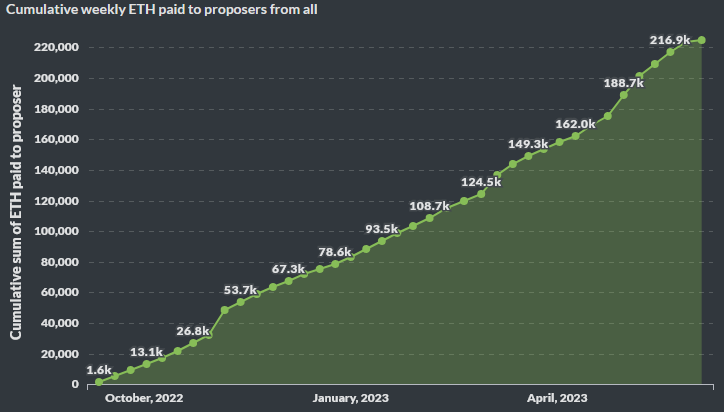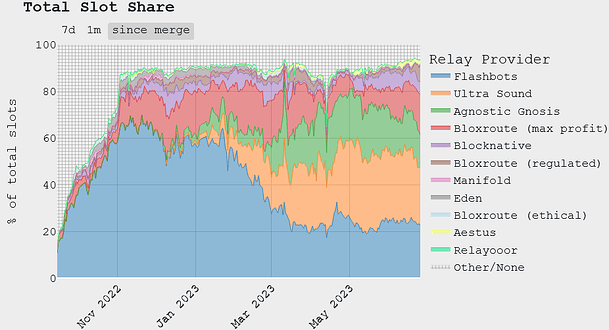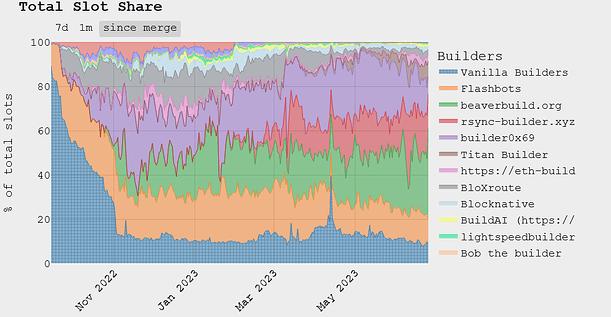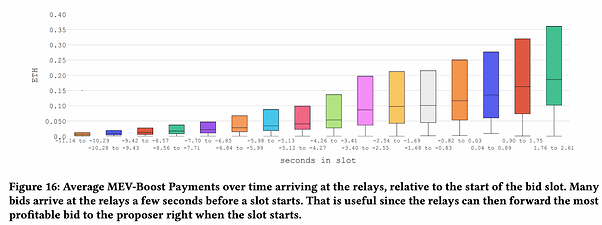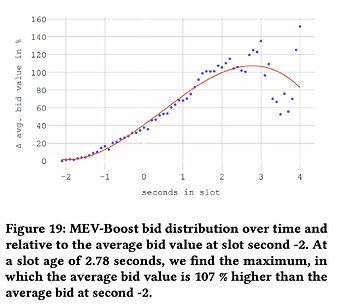Welcome back to another edition of the Flashbots Transparency Report. Before we jump in I want to mention a slight change to the structure of these reports going forward – In order to streamline the content, and make the reports more digestible, I’ll be breaking out the ecosystem highlights into a separate MEV newsletter. This means that the resource list, typically included at the end of these reports will be published in this separate, weekly post to ensure the information remains timely and relevant. Keep an eye on the forum for the first edition to be published next week!
The Transparency reports will continue to be published and contain the latest development, research, discussions, and events related to Flashbots. This edition will cover highlights from May and June. Enjoy!
Redistributing MEV through MEV-Share
We’ve now surpassed 2 million blocks since the Merge, with over 20 million ETH staked on the Beacon chain. Proper-Builder separation through MEV-Boost has enabled a total of 220k ETH to be distributed to proposers, helping the validator set on Ethereum stay decentralized and resilient to capture by sophisticated actors.
From Flashbots Transparency Dashboard: Cumulative ETH paid to proposers since the Merge.
As we continue our mission to democratize and distribute MEV, we look to build protocols that redirect much of this value to back users by granting them more control and bargaining power. Just prior to the last report we announced MEV-Share Beta, and at the end of last month, a record-breaking refund of 10.8 ETH was refunded via a single blind backrun.
If you’re interested in learning how Searching on MEV-Share works in more detail, check out the walk-through of simple-blind-arbitrage hosted by @scott, @brock & @bert. The session delved into how simple-blind-arbitrage can be used to blindly submit atomic arbitrage opportunities through MEV-Share in order to equip searchers with the context needed to build out their own strategies leveraging programmable privacy.
The matchmaker-ts library used by searchers to send bundles to the Matchmaker has received several updates with new features since the last report. As a searcher you’re now able to use the tx_hash hint to communicate with other searchers what transaction you’re bundling (and get a share of their profits if they backrun you!).
Another notable new feature is the deployment of our SSE history API which allows users to look up all historical events shared by the Matchmaker. This provides a quick way to get a feel for the data on MEV-Share, and offers plenty of events to backtest strategies with. For more information on these new features, see the tweet thread by @brock and check out the examples in the matchmaker-ts repository.
Note that the MEV-Share protocol is under active development with new features being added on a regular basis. We welcome and encourage all feedback and questions and invite relevant actors to join the Decentralized Orderflow Working Group to be part of the research and development of the decentralized future of the MEV supply chain.
See our documentation for information on how to connect as a user, and how to integrate MEV-Share into your wallet or dapp. If you’re a searcher looking to get started with MEV-Share and have any questions or feedback, feel free to reach out here on the forum or through Discord!
MEV-Boost
As we approach the one-year mark since the Merge, a period of stabilization can be observed in both the relay and builder markets. Currently, four relays account for 80% of the total market share, while five builders hold an equivalent 80% market share.
From mevboost.pics: Both the relay market (top chart) and builder market (bottom chart) have stabilized in recent months.
The newly published paper Time to Bribe: Measuring Block Construction Market by Anton Wahrstätter, Liyi Zhou, Kaihua Qin, Davor Svetinovic, Arthur Gervais provides a deeper and more comprehensive analysis of these markets and the financial dynamics within the MEV-Boost ecosystem. The paper is packed with interesting data and takeaways, if you’re interested in these topics I recommend giving the paper a read!
From Time to Bribe: Measuring Block Construction Market.
The Beacon chain losing finality
On May 11th and 12th Ethereum experienced two separate events where finality was unable to be reached for 3, and 8 epochs respectively. The root cause of the problem was a large number of missed blocks, which then resulted in nodes attesting to old target checkpoints. Compounding the problem, nodes were subjected to high stress due to the processing of a large volume of deposits. Some nodes were overwhelmed by this surge, which ultimately resulted in the loss of finality.
Consensys Teku and Offchain Labs Prysm released fixes that eased the high resource usage nodes would experience during these scenarios. Offchain Labs also published a post-mortem analysis outlining the incident, what went wrong, where we got lucky, the fixes, and the lessons learned.
The temporary loss of finality had minimal impact on end-user transactions and the chain recovered without any intervention in both incidents. The second event caused inactivity leak penalties to activate for the first time on Beacon chain mainnet. Additional information on inactivity leaks can be found in the Upgrading Ethereum handbook by Ben Edgington. Information on the impact the event had on the p2p network and on users’ on-chain experience can be found in the detailed write-up by soispoke: Cascading Network Effects on Ethereum’s Finality.
Preparing for Cancun-Deneb
The upcoming Cancun upgrade will include EIP-4844: Shard Blob Transactions which introduces a new transaction format and blobs. An initial 4844 update for mev-boost builder-specs has been merged and @terence published Ethereum validator & builder interaction for Deneb that summarizes the updates coming in Deneb that require new validator and builder interactions.
In addition to the preparations for Cancun, a new version of mev-boost, v1.6, has been released. This version is optional but recommended and includes additional data availability, logging improvements, and other minor updates.
mev-boost-relay
Our open-source implementation of the MEV-Boost relay has received a couple of updates since the last report. Below are some of the more noteworthy changes, see the linked release notes for a more comprehensive list of changes:
- mev-boost-relay v0.21 allows for SSZ builder submissions which decode 30x faster than JSON. Block builders can now submit payloads encoded in JSON, SSZ, JSON+GZIP, SSZ+GZIP.
- mev-boost-relay v0.22 includes Optimistic Relay by michaelneuder and allows multiple getPayload calls for a delivered payload by avalonche.
- mev-boost-relay v0.23 Reduce validations by ignoring submissions below the current floor bid (highest non-cancellable bid).
Besides the changes listed above, there’s been a number of significant performance improvements made. @metachris published an overview in two parts detailing these changes: Part 1 & Part 2. Thanks to these recent improvements, zero-downtime deployments are now possible for MEV-Boost relays.
MEV-Boost-Relay Database Migration Guide by @metachris provides steps for managing database growth and reducing operating costs for the MEV-Boost-relays. The post outlines a custom strategy to migrate data to a new, smaller database. It also includes scripts and queries for those who wish to implement a similar migration. For more handy tips related to running a MEV-Boost relay, see Running MEV-Boost-Relay at scale.
Disclosure: boost relay vulnerabilities reported by user @nrv by @metachris describes the details, resolution, and impact of the three vulnerabilities in the mev-boost-relay codebase, found by nrv in April. The issues were resolved promptly and no exploitation was found. nrv asked for the bounty reward to be donated to Médecins Sans Frontières.
Unbundling attacks on MEV relays using RPC by Michael Sproul from Sigma Prime discloses another unbundling attack on MEV-Boost relays that exploits the handling of equivocating blocks received via RPC. A temporary fix to mitigate the vulnerability was included in Lighthouse v4.1.0 with further fixes being considered. The client diversity of Ethereum would have made this attack hard in practice as clients deal with this issue differently.
Prio-load-balancer
The prio-load-balancer which allows relays to manage permissionless builder submissions via high and low-priority queues, has undergone several updates since the last report. These updates have significantly improved logging, providing more relevant information about request performance, including detailed timings and the general state of the system. For more details, see the release notes linked below:
MEV-Boost community call #4
The latest MEV-Boost community call discussed a range of topics, including the ongoing work on EIP-4844 implementation and the next steps for optimistic relaying, with an increase of the collateral from 1 to 10 ETH. The discussion also explored potential funding structures for relays, such as a “Relay Guild”, with a roundtable discussion planned for the upcoming EthCC in Paris.
Keep an eye on this forum, and the Flashbots Collective calendar to get notified of upcoming calls!
Research and discussions
Quantifying Info I: Quantifying The Information Leakage of Computing on Encrypted Transactions by @quintus presents a problem in performing computation on private information where an adversary tries to identify an unknown function from a set of functions using limited queries. The post concludes by asking for literature on this subject, measures of adversary’s learning, and the best policy under time constraints.
[WIP] Quantifying Info II: Quantifying The Impact of Economic Impact of Information by @quintus is a WIP follow-up that introduces economics into the problem by considering the value or impact of the leaked information. It uses two examples to illustrate that how much an adversary benefits from leaked information can depend on the specifics of that information. The post then changes the original problem by including rewards for both the adversary and the one sending the information. This change enables actors to measure the consequences of information leakage and suggests that some leakage might sometimes be useful.
Intent-Based Architectures and Their Risks by @quintus and Georgios Konstantopoulos discusses the concept of “intents”, allowing users to express a desired outcome while outsourcing the task of best achieving that outcome to sophisticated third parties. The post highlights potential risks associated with intent-based designs, including issues of centralization, trust, and opacity. The article further explores the concept of “intentpools,” which are mechanisms for intent discovery and matching and discusses the challenges in designing such systems.
[Re]distribution study circle spearheaded by @guayabyte to study different redistribution approaches has started with two sessions being hosted so far.
- The first session included an introduction to MEV and a discussion how to map MEV to power asymmetries in the dominant economy.
- The second study circle was hosted by @QZ and had a focus on deflationary economies and burning money as a mechanism to redistribute wealth.
A discussion has been initiated on the forum to collect suggestions on topics for upcoming meetings.
Automated Discovery of Potential MEV Opportunities with Contract Analysis by @elegant.song6200 introduce work done to automatically identify potential front-running and MEV opportunities in smart contracts before they are interacted with. The work intends to provide early warnings to users about potential MEV exposure, and simplify the decision process regarding private transaction submission.
Visualization for builders reputation by @vita discusses the risk of block builder centralization and censorship resistance as a result of private order flow. A potential solution is presented by making block builder reputations visible, making it easier for searchers to send to multiple builders. The solution is compared to the behavior of searching for reviews for hotels or restaurants to reduce the likelihood of encountering low-quality service.
Towards Trustless Optimistic Relaying by @SFYLL discusses ways to reduce trust towards MEV-Boost relays. The post suggests leveraging zk-proofs to minimize trust assumptions towards Optimistic relays. The post includes a link to a Github repo with code and more details on the problems and upsides of the proposed approach.
Flashbots Research Proposals (FRPs)
FRP-24: Quantifying MEV on L2s
@Eru_Iluvatar and @0xpanoramix published results from their research with data on atomic token arbitrages on Optimism and Arbitrum, with results from Polygon to be released at a later stage.
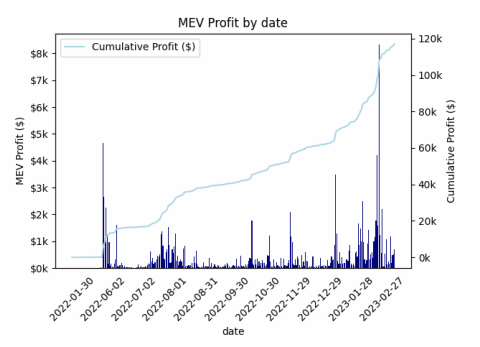
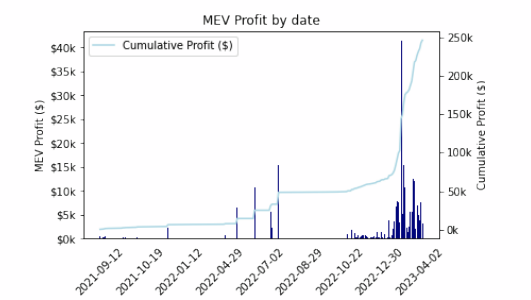
From FRP-24: Quantifying MEV on L2s: MEV Profit by date for Optimism (first chart) and Arbitrum (second chart).
@pillarbear responded in the thread introducing a Dune Dashboard they made with a less exhaustive methodology but with similar results.
FRP-26: Credible Commitments via Open Games
FRP-26 has been completed by 20squares with the team presenting a model built in their open games engine that implements:
- The mental experiments that can be found in Xin’s slides about credible commitments, and
- A more involved example involving a basic AMM.
FRP-27: Auction Simulations under PBS
The other FRP by 20squares on simulating various auction mechanisms for PBS has also been completed. The model allows to simulate and check equilibrium strategies for different kinds of auctions, and it is designed to be modular and extendable.
Flashbots is an open research organization, anyone can submit a research proposal and become eligible for a grant.
Events, talks & podcasts
-
As mentioned in the last Transparency Report, Flashbots and friends hosted CryptoXai.wtf in Zuzalu last month on the intersection of cryptographic- & crypto-economic primitives and AI. Recordings from the event can be found on Streameth by filtering for May 7th at the Lighthouse stage.
-
X-domain MEV via PBS interfaces for SUAVE with @Tomasz during RaaS-day dives into cross-domain PBS, SUAVE, and the concept of MEV-Garden.
-
Proposers, Builders, Sequencers in L1, L2, L3 by @Tomasz at ETH Seoul 2023 discuss the world of staking, MEV, protocol development and the future of Ethereum.
-
The Future of MEV in Ethereum - MEV Burn, ePBS, SUAVE by @Tomasz at BUIDL Asia explores the future of MEV and how it affects protocol security, financial markets and users.
-
Dune Workshop hosted by @sui414 together with 0xBoxer and hildobby at ETHDam looks at ways to leverage Dune to filter and visualize MEV data.
-
MEV TEE Party in NYC with @socrates1024 was an IRL MEV-intern Roast on SUAVE (Slides).
Bell Curve Season 4
The fourth season of the Bell Curve podcast dedicated to the topic of MEV with @hasu as co-host has been wrapped up. Since the last Transparency Report, 3 new episodes on MEV have been published, bringing the total number of episodes to 9:
-
MEV In The Cosmos | Henry de Valence, Barry Plunkett
Barry Plunkett and Henry de Valence discuss MEV in Cosmos compared to Ethereum, the benefits of AppChain sovereignty, the importance of privacy, and more. -
MEV 2.0 - Order Flow Auctions & Privacy | Quintus Kilbourn, Barnabé Monnot
@quintus and Barnabé Monnot join the podcast to discuss OFAs, ePBS and the future of MEV. The conversation then goes into the risks of vertical integration and how we can build systems to mitigate centralization points within the MEV supply chain.- @quintus added more context on the topics discussed in a tweet-thread
-
An MEV Masterclass
In the final episode of the season Mike and Hasu discuss their takeaways from the season, what questions remain unanswered and where MEV markets will go next.
MEV-Week in Paris
Flashbots will host a series of discussions and events during EthCC in Paris this year. Details of these events are still being finalized, keep an eye out on the forum as we’ll post more information soon.
If you’re in Paris and would like to chat – don’t hesitate to reach out!
![]() In order to stay up to date on any upcoming events feel free to subscribe to the Flashbots Collective calendar!
In order to stay up to date on any upcoming events feel free to subscribe to the Flashbots Collective calendar!
Resources
Below is a collection of publications, podcasts, dashboards and other resources from the broader community posted since the last report on topics related to MEV, PBS and Flashbots.
Check out the list from previous months for more fantastic resources and please feel free to share additional resources as replies below or in the bookmark-topics!
Papers
- Time is Money: Strategic Timing Games in Proof-of-Stake Protocols by Caspar Schwarz-Schilling, Fahad Saleh, Thomas Thiery, Jennifer Pan, Nihar Shah, Barnabé Monnot studies timing games in consensus networks like Ethereum, and looks at ways block proposers can strategically delaying their proposals as a way to optimize MEV extraction.
- Towards a Theory of Maximal Extractable Value I: Constant Function Market Makers by Kshitij Kulkarni, Theo Diamandis and Tarun Chitra analyze game theoretic properties of MEV in CFMMs including methods that searchers and CFMM designers can utilize for estimating costs and profits of MEV on these platforms.
- Automated Market Making and Arbitrage Profits in the Presence of Fees by Jason Milionis, Ciamac Moallemi and Tim Roughgarden investigates the influence of trading fees on the profits of arbitrage trading against AMMs. The paper also explores how to set fees and ways to design AMMs to minimize MEV extracted by arbitrageurs.
- Blockchain Censorship by Anton Wahrstätter, Jens Ernstberger, Aviv Yaish, Liyi Zhou, Kaihua Qin, Taro Tsuchiya, Sebastian Steinhorst, Davor Svetinovic, Nicolas Christin, Mikolaj Barczentewicz, Arthur Gervais analyze state-imposed sanctions and their impacts on Ethereum and how censorship not only impacts neutrality but also security.
- Speculative Denial-of-Service Attacks in Ethereum by Aviv Yaish, Kaihua Qin & Liyi Zhou introduces three attacks on Ethereum which combined can clog the victims mempools and render them unable to include transactions in their blocks.
- The Cost of Misspecifying Price Impact by Natascha Hey, Jean-Philippe Bouchaud, Iacopo Mastromatteo, Johannes Muhle-Karbe, Kevin Webster studies what happens when trades are based on an incorrect price impact model, resulting in a portfolio either over- or under-trades its alpha signal.
- Stackelberg Attacks on Auctions and Blockchain Transaction Fee Mechanisms by Daji Landis & Nikolaj I. Schwartzbach examines a potential attack in first-price, second-price auctions and the transaction fee mechanism in EIP-1559 where an attacker could manipulate the system to gain an item for free.
- The Centralizing Effects Of Private Ordeer Flow On Proposer-Builder Separation by Tivas Gupta, Mallesh M Pai, Max Resnick discusses the shift in Ethereums PBS due to private OFAs and suggest modifications to the current structure to achieve a fairer and more decentralized network.
Articles
-
MEV burn—a simple design by Justin Drake presents a design that smoothes and redistributes MEV spikes through a burn mechanism yielding economic benefits similar to EIP-1559.
- Bankless podcast episode with Justin Drake and Dom walks through the reasoning and implications of the design.
- Why enshrine Proposer-Builder Separation? A viable path to ePBS by Mike Neuder and Justin Drake outlines arguments for ePBS and how optimistic relaying may function as a step closer towards ePBS
-
Increase the MAX_EFFECTIVE_BALANCE – a modest proposal by Mike Neuder, Drancesco D’Amato, Aditya Asgaonkar and Justin Drake is a proposal to increase the
MAX_EFFECTIVE_BALANCEon Ethereum to encourage validator set contraction. - A Tale of Two Arbitrages by Eugene Chen, Alex Toberoff, Suraj Srinivasan and, Ankit Chiplunkar is an extension of A new game in town which introduces the notion of risk in the MEV equation.
- The Hitchhiker’s Guide to P2P Overlays in Ethereum by dmarz and Louis Thibault dissects the P2P topology of the Beacon network underlying components and review some of the subtleties and optimizations at play.
- Prysm Updates Q2’23 by Offchain Labs includes a retrospective of the Shapella upgrade, as well as the preparations ahead of Deneb, including hardening MEV-boost & builder testing.
- Understanding Rollup Value Accrual by Electric Capital provides a primer on L2 economics and the key mechanisms through which L2s will accrue value.
- The Little Transaction that Could: Sequencers, MEV, Intents, and more by Archetype unpack rollups, sequencers (centralized, decentralized, shared), cross-domain MEV, intents and the transaction lifecycle.
- The Shared Sequencer; An SoK on Shared Sequencing, Aggregation Theory and Vertical Integrations by rain&coffee looks at the inner workings of Shared Sequencers, why they’re important, and how they will shape the future of rollups as a whole.
- Shared Validity Sequencing by Uma Roy, defi guy and jtguibas describe a shared sequencer architecture for optimistic rollups that enable atomic interoperability.
- The Sting Framework (SF) published by IC3 introduces a new framework that aims to bolster the security of systems that maintain secret state, especially useful for applications built using trusted execution environments (TEEs) like SGX.
- The Future of MEV: Smoothing vs Burning vs Sharing by Joules Barragan explores the benefits and tradeoffs of the paths currently being explored for the future of MEV on Ethereum: MEV-smoothing, MEV-burning, and MEV-sharing.
- Modular Searcher Design: A Framework for Building Searchers by Taker proposes a modular framework for searcher design, taking inspiration from trading systems within traditional finance.
- Distribution of MEV Surplus by Leland Lee looks at the current distribution of value accrual across actors in the MEV supply chain and how the distribution might look going forward.
-
Rollups Are L1s (& L2s) a.k.a. How Rollups Actually Actually Actually Work by Jon Charbonneau looks to clear up some misconceptions regarding the sovereignty of rollups and how these chains should be defined.
- Rollups, Rigor, and Reality by Kelvin Fichter adds more color to the discussion
- The Rollup Multiverse by Jon Charbonneau is a follow-up focused on practical & social implications.
- L2 MEV wat by Teiko maps the current landscape of L2 MEV and gives a brief overview of ways L2s can decentralize and how this might impact MEV.
- The next steps in DEX design by Markus Schmitt provides a summary of some weaknesses in DEX design and explores possible ways to improve.
- Intents and where to find them by Markus Schmitt explain the concept of intents, how they are used today, and various ways they might be used in the future.
- Builder Dominance and Searcher Dependence by Titan Builder explore the dynamics of the Ethereum builder ecosystem, specifically focusing on the relationships between searcher flow and builder market share.
- The MEV Conundrum by Verilog Solutions provides an overview of the current state of MEV, delving into the various players and how they may generate profits.
- Exploring MEV on EigenLayer by Walt Smith examines cross-domain MEV including cross-domain MEV with EigenLayer applications and potential mitigation mechanisms like SUAVE.
- Don’t overload Ethereum’s consensus by Vitalik Buterin looks at how utilizing the Ethereum validator set for other purposes may bring high systemic risks to the ecosystem and should be discouraged and resisted.
- The Three Transitions by Vitalik Buterin discusses the complexities of the three major technical transitions Ethereum needs to undergo as it matures: the L2 scaling transition, the wallet security transition, and the privacy transition.
- Deeper dive on cross-L2 reading for wallets and other use cases by Vitalik Buterin focus on the technical aspects of one specific sub-problem defined in The Three Transitions: How to make it easier to read L1 from L2, L2 from L1, or an L2 from another L2.
-
Proto-danksharding: What It Is and How It Works by Christine Kim provides an in-depth look at EIP4844 slated for the next Ethereum upgrade, including the benefits, impacts, and concerns.
- Thread summarizing the article.
- Ethereum’s Finality Challenge: A Retrospective on the Beacon Chain’s Vitality by Chris | Yicheng delves into the two lack of finality on the Beacon chain and how the network recovered.
- Evaluating Validator Decentralization: Geographic and Infrastructure Distribution in Proof-of-Stake Networks by Stephanie Dunbar and Sam Padilla set out to evaluate the operational decentralization of PoS networks across geographic jurisdictions and node infrastructure.
- DeFi Oracles are Broken by @doge_bull looks at why current OFA solutions like MEV-Share aren’t great for oracles and explains the issue of “Oracle Extractable Value”.
- Research: Data & Function Privacy Architectures by Apriori examine solutions emerging in the privacy design space by examining the data and function privacy architectures of Namada, Penumbra, Taiga, ZEXE & SGX.
- Performance Appraisal of Jaredfromsubway.eth by EigenPhi provides a breakdown of the performance of the sandwich bot Jaredfromsubway.eth which amassed $40.6M in revenue in less than 3 months.
- $30M, 72% of Searchers’ MEV Revenue Went to Validators in 2 Months by EigenPhi looks at the distribution of value accrual across the various actors in the MEV supply chain.
- AL #009: Design with Objectives not Intents by peteris erins discusses the concept of “intents” and argues that they are limited as they focus on actions, not underlying objectives.
Posts & threads
-
Bert Miller shared details of the sandwich strategies used by jaredfromsubway.eth and how users can protect themselves through MEV-Share.
- AI N added more context with examples illustrating how the bot operates and its apparent weaknesses.
- Shea Ketsdever explained further how these bots can get better execution and refunds using an orderflow auction like MEV-Share while simultaneously protecting the users.
- SUAVE smart contract programming model: TEE-based smart contracts for block building Explaining SUAVE to Comp. Sec. researchers in 10 minutes by @socrates1024 goes into detail on SUAVE including pseudocode examples of key smart contract mechanisms.
- lekos explores the behavior of sandwich bots, studying 270,000 sandwich attacks and presenting noticeable patterns and key takeaways.
- Ankit Chiplunkar published a thread on how token prices update on-chain, how arbitrageurs act on these price differences, and the value forwarded to the builder and block proposer.
- Martin Köppelmann looks back at the first month of MEVBlocker with stats on the number of total transactions, backruns, inclusion time and more.
- Eli5_DΞFi published a visual, ELI5, guide of MEV including searcher strategies, the various actors in the MEV supply chain, Flashbots, PBS and more.
- hangry posted a thread exploring SUAVE and how the MEV supply chain has evolved from mev-geth and MEV-Boost.
- EthWiz shares a list of resources guiding through the world of MEV, from beginner to advanced.
- Thogard shared insights into sandwich bots, their win rate and profit margins. The thread also includes a spreadsheet with the ability to play around with the calculations.
- Grace Deng presents an overview of the current landscape of sequencer decentralization and how they cater to different types of rollups
- rain&coffee published a thread looking at shared sequencers through the lens of aggregation theory (AT).
Podcasts & Videos
-
Research Day hosted by DBA, Celestia, Geometry and Robot Ventures was a one-day conference with talks on MEV, intents, sequencing and more. Recordings can be found in the Youtube playlist.
- Grace Deng shared takeaways from the event.
- MEV and Ethereum by Alex Stokes (slides) at ETHGlobal Tokyo provides an overview of MEV including history, censorship resistance, and how the current off-chain PBS can be improved with enshrined PBS.
- MEV Decoded: Understanding Impacts and Unlocking Potential hosted by Blocknative looks at the negative externalities of MEV and how systems can be built to redistribute extracted value.
- To MEV or not to MEV? hosted by CoW Swap discussed the negative aspects of MEV and potential solutions to mitigate these negative effects.
- Protecting Users from MEV with Shuchang Sun, Uri Klarman, Elias Simos, Luis Bezzenberger and moderated by Robert Ellison hosted during ETHDam was a panel discussion on services that aim to protect users from frontrunning.
- Exploring Intents hosted by Celestia was a discussion around intents, starting off with an overview before diving into how intents relate to modular blockchains.
- Ethereum’s role in a cross-domain world (Slides) by Julian Ma dive into the specifics of PBS on Ethereum and how it may fit into a cross-domain world.
- Doug Colkitt - High Frequency Trading, MEV Strategies, and CrocSwap (S6E3) invites Doug Colkitt to talk about High Frequency Trading, MEV Strategies, and new DEX designs in Ambient.
- Farmers Market #23: MEV Alpha hosted by DaoChemist gave an introduction to MEV and how the landscape has evolved after the Merge with MEV-Boost.
- Junion published a video diving into the timeline and details of the $200M Euler finance hack earlier this year.
- Espresso & Aztec: Decentralized Sequencers hosted by Espresso Systems and Aztec discussed approaches to decentralized sequencing, including two proposals put forward by Espresso.
Other
- Releasing Reth! by Georgios Konstantopoulos announced the release of alpha version 0.1.0 of Reth, a new EL-client for Ethereum.
- Payload.de released a new block building dashboard providing insights into the formation of blocks and the competition among builders in real-time. The dashboard also features the ability to sort transactions in blocks.
- DefiLlama plugin by Kofi has been added to ChatGPT giving users the ability to retrieve data on DeFi protocols and blockchains.
- “Flashbots Bundler” by lcfr.eth is an easy to use Flashbots bundler UI for non-technical people to hopefully be able to perform self-rescues on their compromised wallets.
- Rusty-Sando by mouseless is an open source v2-v3 sandwich bot with the goal to act as reference material for searchers looking to implement their strategies using Rust and Huff.
- jq published the GitHub repository used to successfully seize a one-off MEV opportunity to migrate Lido to V2 and mint the first Lido Withdrawal NFT.
- The ultra sound relay received a 100 ETH donation from Nouns in support of their work towards censorship resistance.
- A couple of updates to mevboost.pics have been added since the last report. Updates include a breakdown of which relays each builder submits their blocks to and the number of bids submitted per builder to relays.
Get involved 

At Flashbots, we research and build systems around MEV, and we would love to collaborate with you. We are a distributed organization with the principles of a pirate hacker collective, and we have several open positions. We also issue grants to external researchers doing work aligned with ours, please find out more in our Research repository. Make sure to also look around on our forum and join the conversations!
